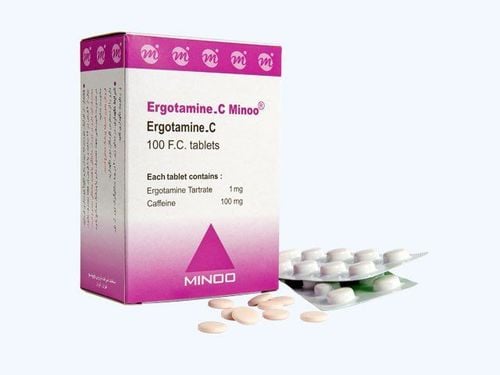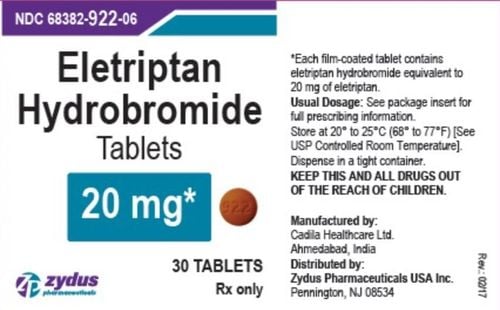This is an automatically translated article.
Migraine headache is a common disease that seriously affects the patient's life. Therefore, the use of therapeutic drugs is extremely necessary, and one of them is Alsuma with the active ingredient Sumatriptan.
1. What is Alsuma?
Alsuma is an injectable form of the active ingredient Sumatriptan and is indicated in the treatment of migraine headaches. Alsuma has been discontinued in the United States.
2. What diseases does Alsuma treat?
Alsuma is a medicine that treats migraine headaches through the mechanism of constricting blood vessels around the brain. Sumatriptan also works to reduce substances in the body that can cause headaches, nausea, sensitivity to light or noise, and other migraine symptoms.
Alsuma is used to treat migraines and cluster headaches in adults, but it should be noted that the drug only works to relieve headaches, not to prevent or reduce the number of headaches. acute phase.
Alsuma is not suitable for the treatment of tension headaches or headaches with paralysis on one side of the body. Therefore, patients only use Alsuma when the doctor correctly identifies migraine.
3. Some warnings of Alsuma when using
Do not give Alsuma to someone who has used MAO inhibitors within the past 14 days because of the risk of dangerous drug interactions.
Do not use Alsuma within 24 hours before or after using another migraine medicine.
Cases where Alsuma should not be used:
History of being allergic to Sumatriptan; Cardiovascular disease, myocardial infarction or cerebrovascular accident (including mild); Coronary heart disease, angina pectoris , circulatory system disorders or conditions that cause ischemia to the heart muscle; Vascular diseases affecting blood supply to the extremities, stomach, intestines or kidneys; Wolff-Parkinson-White syndrome; Uncontrolled hypertension; Severe liver disease; The headache is different in nature from the previous migraine. To ensure safety during the use of Alsuma, patients should discuss with their treating doctor the following issues:
Having liver disease or kidney failure; epilepsy or other seizure disorder; High blood pressure, arrhythmia; Risk factors for coronary heart disease, including diabetes, menopause, smoking, being overweight, high blood cholesterol, a family history of coronary heart disease, being over 40 years old, and being a man, or woman, hysterectomy. Alsuma can affect the pupil during cataract surgery. Therefore, the patient should inform the eye surgeon in advance about the use of Alsuma.
So far it is not known that there is a possibility of harm to an unborn baby when using Alsuma medicine. Therefore, please tell your doctor if you are pregnant.
Sumatriptan in Alsuma can pass into breast milk, but it is not known whether it affects the baby. However, to avoid exposing the baby to Sumatriptan in milk, it is best for the mother not to breastfeed within 12 hours of the injection. In case of using a breast pump, the mother should express all the milk before administering the injection.
Alsuma is not recommended for use by people under 18 years of age.
4. Instructions for using Alsuma
Patients need to use Alsuma injection exactly as prescribed by the doctor, do not change the dose or use it for longer than recommended. You should also refer to the instructions for use of the drug that comes with it. Overusing migraine medications like Alsuma can make the pain worse.
Alsuma is used by subcutaneous injection. Patients will be taught how to use an auto-injector at home, so it is not advisable to self-inject Alsuma if you do not fully understand how to inject.
Alsuma products usually come with instructions for safe and effective use, which patients can follow carefully. If you have any further questions, consult your doctor or pharmacist.
Patients should use Alsuma as soon as they notice migraine symptoms or during acute migraine attacks.
Your doctor may inject your first dose of Alsuma at a hospital or clinic to see if any serious side effects occur.
After using Alsuma medicine but the migraine still does not go away completely, the patient should call the treating doctor before proceeding with the next Alsuma injection. If the headache goes away and then recurs, the patient can have a second injection of Alsuma as long as it is at least 1 hour after the first injection. Note do not use more than 2 injections of Alsuma in 24 hours.
Store Alsuma at room temperature, away from humidity, extreme heat and direct sunlight.
What to do if you miss a dose of Alsuma :
This product is to be used only as needed and does not have a daily dosing schedule; Patients should contact their doctor if their migraine symptoms do not improve after receiving Alsuma injection. Treatment of Sumatriptan overdose:
Call emergency medical immediately or take the patient directly to the hospital as quickly as possible; Symptoms of Alsuma overdose may include tremors, redness, crusting or scaly skin where the injection was given, weakness, lack of coordination, breathing problems, cyanosis of the lips or nails, problems vision problems, seizures, or loss of movement in any part of the body. Patients must absolutely not use Alsuma within 24 hours before or after using another migraine medicine, including:
Products containing Sumatriptan oral or nasal spray; Almotriptan (Axert), Eletriptan (Relpax), Frovatriptan (Frova), Naratriptan (Amerge), Rizatriptan (Maxalt), or Zolmitriptan (Zomig); Ergot drugs such as Dihydroergotamine (DHE 45, Migranal), Ergotamine (Ergomar, Cafergot, Migergot) or Methylergonovine (Methergine). Alsuma may impair a person's thinking or reactions, so be careful when driving or doing anything that requires alertness.
5. Side effects of Alsuma
Some serious side effects of Alsuma require emergency treatment:
A serious allergic reaction to Sumatriptan such as hives, difficulty breathing, swelling of the face, lips, tongue or throat; Sudden severe abdominal pain and bloody diarrhea; severe angina, shortness of breath, irregular heartbeat; Seizures, convulsions; Decreased blood flow to the lower extremities with symptoms or cramps, feeling of tightness or heaviness, numbness or tingling, muscle weakness, burning pain, cold sensation, change in skin color; Severe hypertension with severe headache, blurred vision, pounding in the neck or ears, nosebleeds, anxiety; Signs of a heart attack such as chest pain, pain spreading to the jaw or shoulder, nausea, sweating; signs of a stroke, such as sudden numbness or weakness on one side of the body, sudden severe headache, slurred speech, problems with vision or balance; Serotonin poisoning syndrome such as agitation, hallucinations, fever, tachycardia, overactive reflexes, nausea, vomiting, diarrhea, loss of coordination, fainting. Other common side effects of Alsuma include:
Numbness or burning sensation; A feeling of heaviness in any part of the body; dizziness, drowsiness, feeling weak or tired; Neck pain or stiffness; Facial flushing; Pain, redness, bleeding, or bruising at the site where Alsuma was injected.
6. Alsuma Drug Interactions
Using Alsuma at the same time with certain other medicines can increase serotonin levels in the body, which in turn cause a buildup and lead to a condition known as "serotonin syndrome", which can even cause depression. dead. Patients should tell their doctor if they are taking any of the following medications:
Medicines for depression; Drugs to treat mental disorders; Group of narcotic drugs (opioids); Anti-nausea and vomiting medication. Several other drugs may interact with Alsuma, including prescription or non-prescription drugs, vitamin supplements, and herbs.
Please dial HOTLINE for more information or register for an appointment HERE. Download MyVinmec app to make appointments faster and to manage your bookings easily.













